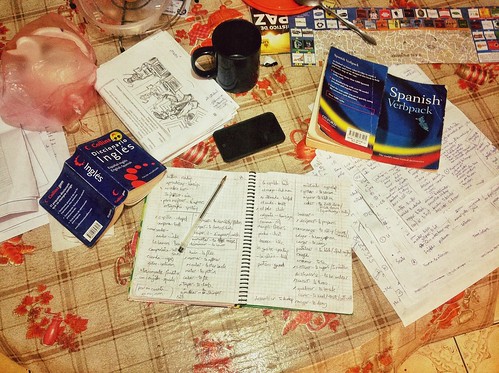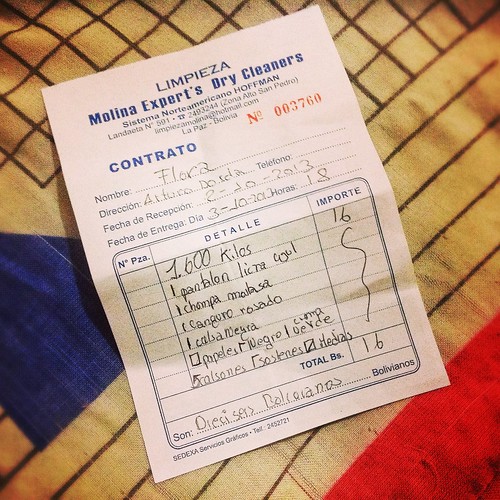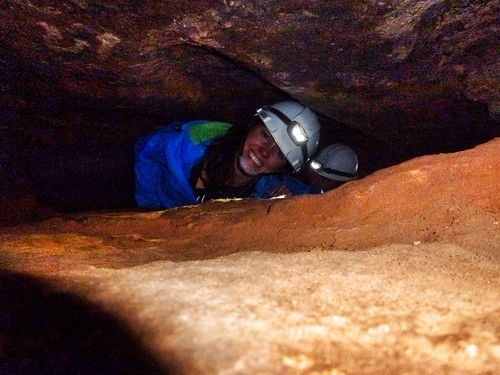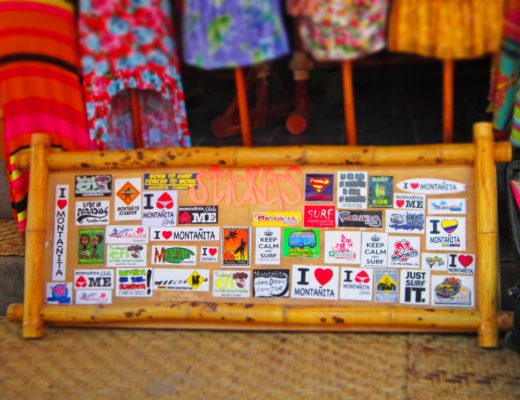Coming to Medellin was always supposed to be the final push on my Spanish skill levels. I would live and work in the Colombian city for four months, emerging with not just a introduction to journalism under my belt, but also with an easy fluency in the Spanish language and a legacy of Colombian friends who I’d been practicing with.
I may have overestimated slightly.
As it turns out, being in an office filled with foreigners who share English as their common language means I speak English. Writing for an English newspaper means, surprisingly, that I write in English. And though I look through countless news articles in Spanish every day, I don’t have time to decipher their meaning accurately in my head – so into Google Translate they go, and I skim read the bad English translation instead.
In short, I speak much less Spanish in this job than I ever thought I would.
There’s still a Spanish speaking role that comes with Colombian journalism, though. To make it as a reporter and a journalist – to get the stories, the sources, the facts – I need to talk to people. On the phone. In Spanish.
And for someone who really doesn’t like making phonecalls in their first language, let alone in their second, you can imagine how this situation has made me feel.
Yep, utterly terrified.
Making phone calls in Spanish
The first ‘trial by fire’ phonecall occurred in my second week at the newspaper, and involved calling someone to get a quote about an environmental issue. I was given a contact number and the office’s Skype login, but there the help ended. I didn’t know much about the background of the topic, so I figured I’d just ask for a concise rundown of what his opinions were.
Which of course proved utterly pointless when I realised that my Spanish was in no way good enough to discuss the Colombian environment with a stranger. This realisation occurred at the exact minute the guy picked up the phone.
Stuttering rather significantly, I attempted to ask him for easily digestible information, but even my basic questions fell flat: garnering only a repeated “como?” in response.
The next few calls I had to deal with went in a similar vein, until eventually the heart palpitations at the prospect of failing yet again led me to only calling people who I knew I could speak English to.
By the end of my third week in the city, I’d resolved to take some more Spanish classes. I knew that I wasn’t going to magically have the desire to call up someone and ask them questions in a language I’d lost confidence in, so a few hours with a teacher seemed the only way to go.
But chatting to my friend Larissa about the issue yielded an interesting response.
“You don’t need lessons, or grammar,” she told me. “You just need to talk.”
Speaking Spanish – and having problems
Over the last year in South America, I’ve resorted to classes when I felt at a language impasse. I enrolled at Spanish schools in Colombia, Bolivia and Peru in the hope that they’d be my key to improving – and for the most part those classes significantly helped.
But ultimately my biggest game changer has always been to speak.
So I spent the next month in Medellin trying hard to speak in Spanish as often as I could. Still terrified of phoning people in my journalistic capacity, I found other alternatives; language exchange evenings at my old hostel, chatting to locals on nights out, and trying to engage shopkeepers in a bit of conversation.
There were my two Colombian roommates too, who I had high hopes for, but we never shared more than a few casual passing greetings in the corridor.
Sadly, none of it really helped. I realised this when I went to the Caribbean coast for ten days with Josh: while it was easy enough to communicate with locals, I couldn’t shake the feeling that, in just two months, my Spanish skills had actually decreased.
Luckily, that trip to the coast – which acted as a break from the newspaper – made me see things with a bit more clarity. Namely, that I was being significantly self-deprecating about a situation that really wasn’t my fault.
A bit of Spanish clarity
Ok, so being unable to get a quote from someone because you can’t speak their language adequately enough is embarrassing. But it’s not like I ever said I was fluent in Spanish, or was granted the newspaper job because my editor thought I was. And if I’d really thought about it, I would never have assumed I’d reach a point where Spanish phonecalls would be a breeze.
I’ve only been learning Spanish for sixteen months, after all!
More than that, though, was the awareness that I really hated trying to make those calls; not just because of my lack of Spanish, but for the calls themselves. Try as I might, I don’t have the “give me a quote, I don’t care if you don’t understand what I’m saying, I won’t take no for an answer” attitude.
Or rather, I think I do have that attitude when I’m passionate about what I’m doing.
Moving out and moving on – to the next country…
I’ve loved living in Medellin. I pass the same faces on my morning commute into work, and I finally understand how the buses work.
I have my local bakery a five minute walk away, where the woman calls me ‘princesa‘ and automatically tells me whether they have ‘jamon y queso’ rolls that day. The laundry next door writes my name on the ticket before I say anything.
But my local life here is not what I imagined. The romantic traveller in me, as usual, expected a life filled with groups of Colombian friends, constant Spanish practice, and plenty of time to explore the city during the time away from the newspaper. In reality, the newspaper absorbs the vast amount of my days, with only six hours to chill out each evening. And spending the last month with my boyfriend living in Medellin too meant we spent most of our free time together, rather than hanging out with Colombians.
With Josh’s recent return to England, I had a sudden realisation of how the next few months would most likely play out: a combination of work, writing, and essentially preparing for my own eventual return to life in London.
So I’m striding out for pastures new. At the start of June I’m flying to Havana, for just under a month of Cuban explorations.

Photo by Anton Novoselov
Cuba is a country I’ve long wanted to visit, but for some reason hadn’t entertained the prospect while being in South America. I guess it didn’t register on my radar?
So why Cuba?
Going to Cuba – quite apart from simply being an awesome place to go – also makes sense in terms of flights. I always knew I’d be heading back to London in July, to prepare for my Masters degree which starts in September, so I’d been looking at flights from Bogotá to London which ran at a hefty £600 or more. But flying Bogotá to Havana and then Havana back to Europe comes to a rather pleasant £530. Which basically meant I had no choice but to go to Cuba…
Much as I’ve loved my time here, I can feel myself becoming slightly stagnant. It’s my second time in Colombia in a year, one of five countries I’ve spent sixteen months travelling through. I feel a bit too comfortable – and I’d prefer to feel challenged by somewhere completely new.
I don’t want to look back and realise I spent my last month in South America simply waiting to fly home. Seems like a pretty tame end to such an eventful journey.
And lastly, let’s not forget what a month in Cuba will mean for my Spanish. After sixteen months of learning the language, I figure this is the best my Spanish is ever going to be – on this trip, anyway. So what better way to use it than by attempting to only speak Spanish for a month in a totally new country?
Cuba is known for its very friendly locals who love to talk to strangers, which, combined with a distinct lack of internet to provide any kind of distraction, means I’ll be able to spend a month getting under the skin of the country by going back to basics. Speaking in Spanish with anyone who’ll listen, and then writing it all down.
With only pen and paper, for once.
Have you ever been to Cuba? If you have any tips for me they’d be seriously welcome!











22 Comments
Contented Traveller
May 29, 2014 at 7:07 amI love it when I come across a post that i not only identify with but I want to read it from beginning to end. Great post, personal and approachable. Take care and enjoy Cuba. Paula
Flora
June 2, 2014 at 4:51 pmThanks so much Paula – glad you enjoyed it!
Hannah
May 29, 2014 at 11:36 am“And for someone who really doesn’t like making phonecalls in their first language, let alone in their second, you can imagine how this situation has made me feel.”
Ha! I know how that feels. Good luck on your trip to Cuba, it’ll be absolutely fantastic.
Flora
June 2, 2014 at 4:56 pmIt’s a nightmare! Particularly when I don’t understand the subject matter as well as what the other person’s saying..
Alyssa James
May 29, 2014 at 3:43 pmHey Flora, it was great meeting you in London with Brenna! I’ve been following your experiences in Colombia and though it’s had its ups and downs, I think you’ll find you’ve achieved more than you think you have right now. I’d LOVE to go to Colombia (I’m thinking of making it my next expat destination, actually) – Cuba as well. As long as you’re not staying on a resort, you’ll have plenty of people to chat to! Take care and good luck!
Flora
June 2, 2014 at 4:54 pmThanks Alyssa, I hope that does happen! You should definitely go to Colombia soon, it’s such an incredible country. Although I’m ridiculously excited to see what Cuba has to offer 🙂
Alana - Paper Planes
May 31, 2014 at 12:47 amLooking forward to your Cuba posts – I’ve always wanted to go but….I’m American.
Flora
June 2, 2014 at 4:52 pmI’m looking forward to writing them, Alana!
Zoe @ Tales from over the Horizon
June 3, 2014 at 1:01 amReally good post. The English Bubble can be really hard to get out of. I’ve never been to Cuba I’m sorry, but I’ve heard really great things about it.
Flora
June 8, 2014 at 9:18 pmYep, me too! I think it’s going to be an amazing destination 🙂
Dyanne@TravelnLass
June 4, 2014 at 12:38 amI too considered Columbia when I opted to (finally, after nearly 3 years in Asia, where I hadn’t a prayer of ever learning Vietnamese) head to a country where (given my long neglected, rusty Spanish) I had at least a smidge of a chance of becoming half way fluent. But instead, I ended up (happily) here in Ecuador.
And yes, yes – I just recently published a post on the struggle to learn Spanish, and likewise – the gist was “Wanna Learn Spanish? Speak Like an IDIOT!”
In short, no amount of nifty Duolingo et al apps, nor books, nor classes, nor nuthin’ is going to do it – if you want to learn Spanish (or any other foreign language) you gotta…
Simply START.SPEAKING.IT. Sure you’ll sound like an idiot at first, but it’s really the only way. So just get over yourself, and stop worrying about sounding like an idiot. But just S.P.E.A.K. and speak and speak and speak – every blessed chance you get.
Leastwise that’s what I’m doing here in Cuenca, and… by golly, I’m already able to crack a joke with a taxi driver and – he gets it!
Flora
June 8, 2014 at 9:18 pmGood to hear you’re speaking so much Spanish Dyanne – it’s definitely been the best possible way for me to improve my Spanish skills. I hope Cuenca’s treating you well too!
Dyanne@TravelnLass
June 8, 2014 at 9:32 pmIndeed it is, Flora! Took a good bit to get use to the 25% less oxygen up here at 8,000+ feet (3 months to acclimatize fully, but it’s different for everyone of course), but the climate if fabulous, and in but a few weeks I’ll have my PERMANENT residency – yay!
Flora
July 11, 2014 at 12:21 amThe altitude definitely takes some getting used to. Glad you’re settling in so well though!
Britany
June 6, 2014 at 3:36 pmI also HATE making phone calls. I can’t imagine making them in a second language. Good for you for trying though! I’m sure the experience was worthwhile. And I’m so excited to hear about your time in Cuba! It’s at the top of my list for the next international trip so I will definitely be following along. 🙂
Flora
June 8, 2014 at 9:15 pmI think trying is as far as I’m ever going to get! For the moment at least. Glad you’re keen on Cuba too!
Jessica (Barcelona Blonde)
June 11, 2014 at 11:19 pmI’ve never been to Cuba, but I think it IS true that the only way you can ever really improve your language skills is by practicing and actually using the language in normal situations. It’s really intimidating at first, and I wouldn’t have done it unless I was forced to. But I was stuck in a situation where nobody spoke English for four months, and in those four months my Spanish went from nonexistent to totally functional.
Three years on, it’s not a problem anymore, but phone calls are still scary!
On the other hand, I lived with a girl whose Spanish grammar was 100% perfect…and she never practiced it because she was uncomfortable. That meant she could write a decent essay, but struggled to order at the bar. In the end, her Spanish just wasn’t very useful for communicating. Books can only get you some of the way. It’s a bit like learning to drive or cook a complicated recipe by just reading the instructions.
Good luck trying to push through! It’s tough but worth it.
Flora
July 11, 2014 at 12:32 amIt’s weird how you suddenly switch into a “ok, I just have to DO this then..” mode when there’s no other option! I’m still really glad I didn’t study Spanish at school as it meant I approached it with a completely fresh outlook, and had to practice as I went.
Andreas Moser
June 25, 2014 at 5:21 am1,600 kilos of laundry?
Andreas Moser
June 25, 2014 at 5:29 amIf both your job and your partner are English-speaking, there is no chance to really learn another language well. These two parts of life just take up too much of our time.
I have the same problem, on both accounts. 🙁
Flora
July 11, 2014 at 1:21 amTrue, but I think there’s always a way, if you really want to improve your language skills. Of course, travelling through or living in the country of the language you’re learning definitely helps!
And I’m pretty sure it was 1.6kgs..! Otherwise I both have a ton of extra clothes and got a very good price for them.
Workers of the World Weekly: February 9, 2018
February 9, 2018 at 12:16 am[…] The Spanish Challenge: Being a Journalist in Colombia Going to Medellin was always supposed to be the final push on Flora’s Spanish skill levels. She would live and work in the Colombian city for four months, emerging with not just an introduction to journalism under her belt, but also with an easy fluency in the Spanish language. Yeah, about that. […]